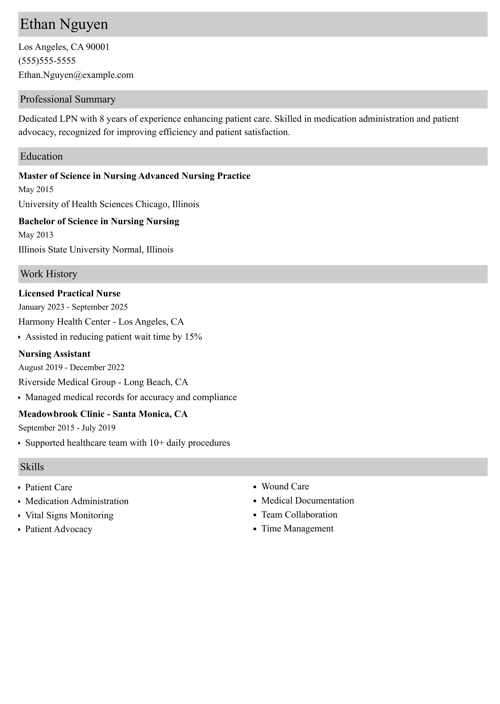Like it or not, resumes are important. This little one-page document, full of information that doesn’t even correlate with job performance, decides whether you’re worth interviewing or not.
Clearly what you put on a resume matters—employers want to see relevant experience and skills.
But what should not be included in a resume could matter even more. Why? Because recruiters are extremely busy, and they’re looking for any excuse to toss your resume aside.
To write a job-winning resume, you need to know what to keep off your resume.
Read on and you’ll see 15+ red flags for recruiters that you should leave off your resume if you want to land as many interviews as possible. Let’s get started!
Want to save time and have your resume ready in 5 minutes? Try our AI resume builder. It’s fast and easy to use. Plus, you’ll get ready-made content to add with one click. See 20+ resume templates and create your resume here.
Sample resume made with our builder—See more resume examples here.
If you’re interested in the opposite question, what to put on a resume, check out: What to Include on a Resume?
Recruiters have it tough. For every corporate job, they receive an average of 250 applications (according to hiring statistics) they need to parse through. To get through them, they spend only 7 seconds on average scanning each resume. In those few seconds, recruiters are looking for any misstep or mistake they can use to justify tossing your resume in the “reject” category.
There’s a lot that goes into writing the perfect resume, but today let’s focus on what not to put on a resume. If you can avoid these common resume mistakes, you’ll have a fighting chance.
Here’s what should not be included on a resume:
1. The Passive Voice
Although great to use in your creative writing, leave the passive voice off your resume. Why? Because when you’re writing resume job descriptions, the passive voice obscures who performed an action or achievement, and your resume should be about you. Here’s an example for a social media manager:
Passive voice: Acme Co’s Instagram followers grew from 0 to 55,000 in six months.
Active voice: Grew Acme Co’s Instagram followers from 0 to 55,000 in six months.
The second example sounds significantly more impressive, right?
The active voice shows what you accomplished and implies a sense of leadership, a skill desirable for any job.
Read more: What Voice and Tense to Use in a Resume?
2. A Generic Resume Objective
If you’re going to write a resume objective that looks something like this:
“Hardworking mechanical engineering graduate looking for positions in the field of mechanical engineering.”
You can safely delete it and use the extra space on your resume to add to another section.
Why? The resume objective above provided no useful information. Of course a mechanical engineer is looking for a mechanical engineering job. Resume objectives only work if they’re tailored to match a job description.
Read more: How to Write a Resume Objective Statement [50+ Examples]
3. The Pronoun “I”
Since resumes should be written in first person and using the active voice, you may naturally be drawn to using the word “I”. Don’t do it. Since resumes should be written in first person implied, writing out “I” becomes redundant and looks unprofessional. Here’s how to not say I in a resume job description:
| WRONG |
|---|
|
| RIGHT |
|---|
|
4. Your Exact Address
You might think putting your exact address on a resume can’t hurt—but you’d be wrong.
If you’re applying for out of state (or city) positions, the recruiter might not be sure if you’re serious about moving, or think you’ll demand a relocation bonus.
Even if you are in the same city, if your address is on the other side of town, they may think a long commute would negatively impact your job performance.
Best to play it safe and give a general address such as “City, State”.
Read more: Should You Put Your Address on Your Resume?
5. “References Available Upon Request”
Once upon a time, this phrase served a purpose—but that time has come and gone. Nowadays, hiring managers know they can ask for references and applicants are expected to hand them over.
You can confidently leave “references available upon request” off your resume and use the additional line to add extra resume achievements.
Read more: Should You Put References Available Upon Request on a Resume?
6. A Picture of Yourself
Laws are in place to prevent employers discriminating based on race, sex, sexual orientation, religion, national origin, physical disability, and age. Now that becomes pretty difficult the moment you decide to put a picture on your resume.
From an HR perspective, picking the candidate with a photo on their resume is like asking for a discrimination lawsuit. Don’t shoot yourself in the foot.
With that said, chances are the recruiter will see what you look like before the interview. Many employers will Google your name to find your online presence during the hiring process. So make sure they see the photo of your choice. Add a professional photo to your LinkedIn profile (one of our many LinkedIn profile tips).
7. Lies
Even though it’s technically not illegal, lying on your resume is a bad idea. Chances are that you’ll be caught red-handed during the interview process. And even if not, you’ll be fired from the job once you’re found out.
8. Your High School (If You Completed College)
Only include your high school diploma on a resume if you’re still in high school, or if it’s the highest level of education you completed. Even if you were the valedictorian, a college degree overshadows your high school experience.
Making a resume with our builder is incredibly simple. Follow our step-by-step guide, use ready-made content tailored to your job and have a resume ready in minutes.
When you’re done, our AI resume builder will score your resume and our resume checker will show you exactly how to improve it.
9. An Unprofessional Email Address
Rest assured that your resume will be sent to the trash folder the moment the hiring manager notices that your email address is “Numba1BamaFan_ROLLTIDE@gmail.com”. If your email address doesn’t look something like “firstname.lastname@gmail.com”, consider creating a new email address for your job search.
Also, don’t use your current work email address. It looks disloyal and you’ll likely lose access anyways if you’re changing jobs.
Read more: How to List Contact Information on a Resume
10. Private Information (Sex, Marital Status, Etc)
In most cases, it’s illegal for employers to ask about your age, country of origin, gender, disability, marital status, race, or religion. Avoid including this kind of private information on your resume so that you’re not putting the employer in hot water if they hire you.
11. Salary History or Requirements
Don’t include your salary history on your resume! In some states, it’s not even legal for employers to ask what you made at previous jobs. Regardless of legality, negotiating a salary becomes significantly harder if your prospective employer finds out your salary history.
When it comes to salary requirements, only include them on a resume or cover letter if requested by the employer. The time for negotiating a salary comes at the end of the job interview process.
12. Every Job You’ve Ever Held
Once you have been on the job market for a long time, jobs you held in the 80s, 90s, and early aughts aren’t considered relevant experience. Why not? If those old jobs are in the same field you are in currently, you’ve most likely gained better, more applicable experience since then. If they’re in a different field, then they’re irrelevant anyways.
Read more: Should You Include Irrelevant Work Experience on a Resume?
13. A Low GPA
Here’s a secret that might bring you a sigh of relief: You don’t have to put GPA on a resume. It’s not required, and in fact, including a low GPA will only hurt you. Only add your GPA if it’s higher than 3.5 or if the employer requires it.
14. Buzzwords and Superlatives
Avoid resume buzzwords like “outside the box thinker”, “hardworking” and “results-driven”. They’re more likely to induce an eye roll than impress the hiring manager. Likewise, using words like “best” and “excellent” don't impress as much as you might think.
If you want to actually stick around in the hiring manager’s mind, use action verbs for resumes and let your achievements speak for themselves.
Read more: Resume Buzzwords, Adjectives, Power Words and Action Verbs
15. Jobs You Didn’t Have for Long
It’s better to have employment gaps in a resume than to list jobs that you only held for a month or two. How come? Well, a short-lived job is likely to leave a bad impression on the recruiter.
They’ll be thinking “I wonder why they left so early? Are they a job hopper? Were they fired that soon? Something smells fishy.” There are good reasons for leaving a job, but first you need a resume that will get you an interview.
16. Irrelevant Skills
Professional skills are important. Many HR professionals struggle to find candidates with the right job skills.
But that’s in relation to relevant skills. Being skilled at social media would be great for a marketing manager. But if you’re a pharmacist, CVS won’t care how many followers you have on Twitter. Use the resume real estate for something more important.
17. Weird Hobbies or Interests
Adding a list of interests on your resume can make you seem more personable and act as conversation starter during an interview. But there’s a fine line between adding a bit of personality to your resume and making the recruiter think you’re odd. Try not to cross it by including something like “My Little Pony enthusiast”. (Sorry bronies!)
Plus, a great cover letter that matches your resume will give you an advantage over other candidates. You can write it in our cover letter builder here. Here's what it may look like:
See more cover letter templates and start writing.
Key Takeaway
Learning how to build a resume is a skill in and of itself. It’s important to figure out both what to put on it and what should not be included in a resume. When in doubt, use a professional resume template to take the guesswork out of making your resume.
About Zety’s Editorial Process
This article has been reviewed by our editorial team to make sure it follows Zety's editorial guidelines. We’re committed to sharing our expertise and giving you trustworthy career advice tailored to your needs. High-quality content is what brings over 40 million readers to our site every year. But we don't stop there. Our team conducts original research to understand the job market better, and we pride ourselves on being quoted by top universities and prime media outlets from around the world.


![What Should Not Be Included in a Resume? [15+ Things]](https://cdn-images.zety.com/pages/what-should-not-be-included-in-a-resume-ztus-cta-02.webp)


